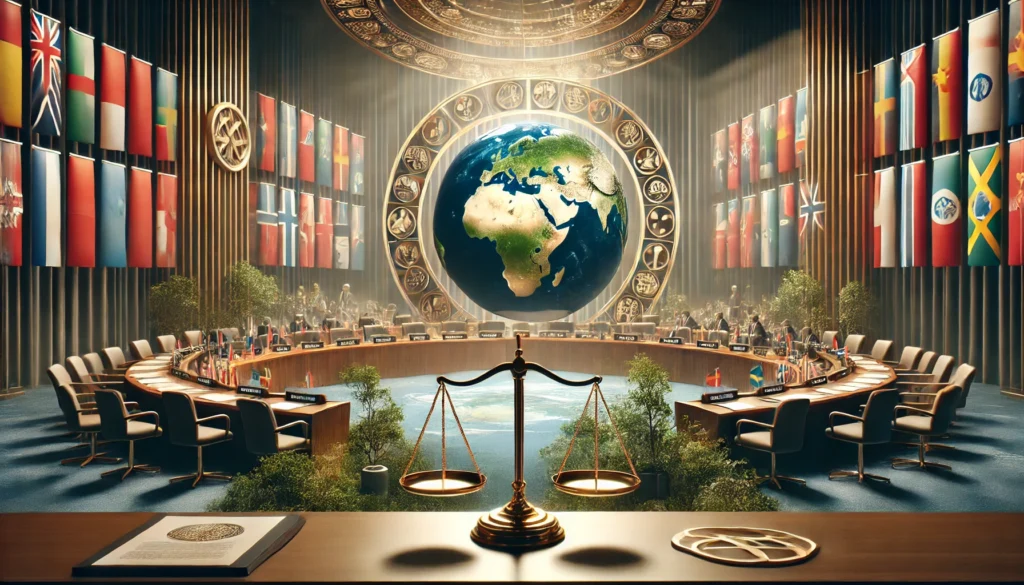Published On: 24th October, 2024
Authored By: Muskan Yadav
Amity University Gurgaon
Abstract
The ICC (International Criminal Court) is an important institution that exists to prosecute individuals alleged of the most serious international crimes including war crimes. The International Criminal Court acts as a permanent tribunal for investigating, prosecuting, and trying those guilty of genocide, crimes against humanity, war crimes, and crimes of aggression.
Its mandate is meant to put an end to impunity for these crimes and prevent them from happening again by prosecuting perpetrators. In times when national courts are unable or unwilling to investigate or prosecute such cases, the ICC seeks to complement them. This court has achieved great success in the field of international criminal justice, with current cases related to various conflicts in Ukraine and, the Israel-Hamas wars, among others.
Nonetheless, it has faced challenges in its quest for universal membership since some prominent countries like the United States, China, and Russia have not ratified the Rome Statute. Concerns have also been raised around impartiality of this court; efficiency in delivering justice as well as cooperation with states. Some individuals argue that prosecution extends the length of conflict while at the same time inducing further violence because leaders are made unlikely to leave nonviolently.
Even though there are serious problems, the ICC is still an important part of the worldwide effort to prevent punishment for murder crimes and other serious global misdeeds. The continuous proceedings serve as proof that the court believes in giving fair treatment to victims and punishing those who commit the worst crimes on earth.
Keywords
International Criminal Court (ICC), War Crimes, Accountability, Impunity, Rome Statute, Justice [1]
Introduction
The establishment of the International Criminal Court (ICC) by the Rome Statute in 2002 marked major strides toward global justice with an emphasis on war crimes. As it stands out as being the first and only permanent worldwide court that deals with the most serious crimes committed against humanity, the ICC was therefore designed to guarantee that people especially those in power during armed conflicts such as presidents and military leaders, are made responsible for their actions. Its jurisdiction covers crimes like genocide, war atrocities, human rights abuses, and aggression, which reflect an aspiration to establish the rule of law at the international level.
According to the Geneva Conventions and Rome statute war crimes include the serious breaking of laws and customs of wars which include infamous killing, and capturing hostages among others also described as torture in every aspect. This includes the willingness of all parties involved in a conflict who may want to ignore them because they are not interested for whatever reason especially if there is no money for investigation purposes too; this makes ICC very important in terms of fighting these types of horrible things happening today during African conflicts where people are being paid cash by governments instead when accused before national courts then they go free without any charges against them leaving behind many dead bodies on streets because there are no freed areas anymore due to poverty or tribal division inside countries.
The ICC has been set up mainly to help victims get justice while at times preventing future violations by raising awareness about personal responsibility among leaders Ralph says “What can be done? So please do something!” However, despite its good intentions, the ICC continues to face several challenges political resistance from non-member countries, and allegations of bias among other issues.[2]
Historical Background
The International Criminal Court (ICC) is an international court governed by a treaty called the Rome Statute that was signed in July 1998 and came into force in 2002. The court’s main purpose is to pursue those responsible for genocide, war crimes, crimes against humanity, and aggression, among others. The establishment of this court is considered one of the greatest achievements in international law as it seeks to ensure that persons responsible for war crimes or any form of mass murder are held accountable before a neutral arbiter. It should be noted that it takes cognizance of all cases already addressed at the national level except for genocide cases which are tried exclusively by this court. There have been many investigations made so far particularly on atrocities committed during conflicts [3][4]on African soil even though critics argue that it has a propensity towards bias and has jurisdictional limitations across the world. Key historical precedents include the Nuremberg and Tokyo Trials which laid down the foundations for contemporary international criminal law.
Causes
The International Criminal Court (ICC), established in 2002 under the Rome Statute, prosecutes individuals for genocide, war crimes, and crimes against humanity, aiming to promote accountability and deter future atrocities. It operates as a court of last resort, complementing national jurisdictions. However, the ICC faces challenges, including criticisms of bias, limited jurisdiction over non-member states, and accusations of focusing disproportionately on African nations. Despite these hurdles, ongoing investigations, such as those related to the Ukraine conflict, highlight its role in addressing serious international crimes.
Exceptions
The International Criminal Court (ICC) operates under specific exceptions and limitations that impact its ability to prosecute war crimes. Firstly, the ICC can only address crimes committed after the Rome Statute came into force on July 1, 2002, and it has jurisdiction only over countries that are parties to the Statute or cases referred by the United Nations Security Council. Additionally, the principle of complementarity means that the ICC can only intervene when national courts are unable or unwilling to prosecute alleged crimes. This ensures that the ICC respects national sovereignty and judicial processes, but it can also limit its effectiveness in holding perpetrators accountable.
Moreover, the ICC faces challenges related to non-retroactivity, meaning it cannot prosecute actions that were not considered crimes under international law at the time they were committed. The prosecution of the crime of aggression has further limitations, as its definition was only finalized in 2018, and no cases have yet been brought before the Court. Political and diplomatic considerations also play a significant role, as some states may refuse to cooperate with the ICC, hindering its ability to investigate and prosecute war crimes effectively. These exceptions highlight the complexities and challenges the ICC faces in its mission to promote.
Guidelines
Since this entails regularization and guidelines that guide the prosecution of war crimes and other serious offenses, all norms have been arranged under the International Criminal Court (ICC) that are formulated with the help of the Rome Statute. The Court’s jurisdiction including rights accorded to both accused persons as well as victims are explicated in these guidelines, in addition to investigation and trial processes. Some of its principles are complementary one that says that the ICC can only act if no national court is willing or able to prosecute someone and a fair trial together with legal representation must be respected by the ICC. Also, all activities should be recorded and made available to the public where necessary because accountability is one of the main aspects that drives transparency.
In addition, ICC has rules concerning case management such as how evidence is submitted, how witnesses are called, and warrants are issued. Specific rules have been set aside by the Court for collecting evidence and displaying it allowing every participant an opportunity to go through what others have presented. In addition, through reparations and participation mechanisms, it also shows how it cares about victims’ rights.
Interpretations
United Nations, international legal definitions have been a challenge. Keeping pace with rapidly evolving contexts in various countries remains a major concern. Scholars still argue because they are not sure of what is intended by this term in matters concerning ICC. Countries get instructions on how to comply through different in their cases different, for example, ICC has put up a hierarchy of laws that are the first ranks among other things emphasizing on Rome Statute itself at the top position and then Elements of Crimes and the Rules of Procedure thereafter. Where there arise conflicts between them; Rome statute takes precedence over the other texts. This structured arrangement serves to sustain clarity as well as consistency in dealing with legal complexities related to war crimes or crimes against humanity.
Furthermore, through its rulings, decisions made by the Court can change its own understanding based on global agreements, established customs, and judicial decisions from other courts globally including the International Court of Justice (ICJ). Even though such moves do not have any binding force, ICC could still glean some insights from earlier pronouncements it made. Therefore, the dynamic interpretation process makes it possible for the ICC court to respond effectively to new legal challenges emerging from different parts of the world thereby enhancing accountability mechanisms for situations where governments fail to address situations that lead to serious human rights violations.
Conclusion
The International Criminal Court (ICC) plays a vital role in the global legal landscape by prosecuting war crimes and ensuring accountability for grave violations of international law. Established under the Rome Statute, the ICC addresses atrocities that national courts are unable or unwilling to prosecute, thereby filling a crucial gap in international justice. Through its jurisdiction over war crimes, genocide, and crimes against humanity, the ICC aims to deter future violations and promote respect for human rights.
Despite facing challenges such as political resistance and questions of legitimacy, the ICC remains a cornerstone in the fight against impunity. Its ongoing efforts to investigate and prosecute perpetrators of war crimes underscore the international community’s commitment to justice and the protection of vulnerable populations. As the ICC continues to evolve, its impact on global justice will be pivotal in shaping the future of international criminal law. [4]
References:
[1] https://www.mpil.de/files/pdf3/mpunyb_doermann_7.pdf
[2] https://www.government.nl/topics/international-peace-and-security/international-legal-order/the-international-criminal-court-icc
[3] https://www.icc-cpi.int/sites/default/files/NR/rdonlyres/ADD16852-AEE9-4757-ABE7-9CDC7CF02886/283503/RomeStatutEng1.pdf
[4] https://blog.ipleaders.in/all-you-need-to-know-about-the-international-criminal-court-icc/




